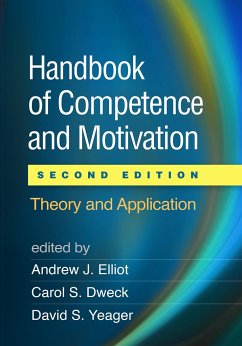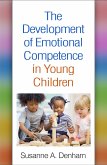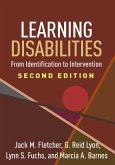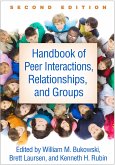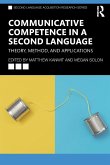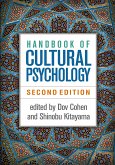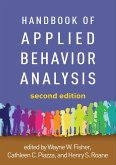Handbook of Competence and Motivation, Second Edition
Theory and Application
Herausgeber: Elliot, Andrew J.; Yeager, David S.; Dweck, Carol S.
Handbook of Competence and Motivation, Second Edition
Theory and Application
Herausgeber: Elliot, Andrew J.; Yeager, David S.; Dweck, Carol S.
- Broschiertes Buch
- Merkliste
- Auf die Merkliste
- Bewerten Bewerten
- Teilen
- Produkt teilen
- Produkterinnerung
- Produkterinnerung
Now completely revised (over 90% new), this handbook established the concept of competence as an organizing framework for the field of achievement motivation. With an increased focus on connecting theory to application, the second edition incorporates diverse perspectives on why and how individuals are motivated to work toward competence in school, work, sports, and other settings.
Andere Kunden interessierten sich auch für
![The Development of Emotional Competence in Young Children The Development of Emotional Competence in Young Children]() Susanne A. Denham (United States George Mason University)The Development of Emotional Competence in Young Children63,99 €
Susanne A. Denham (United States George Mason University)The Development of Emotional Competence in Young Children63,99 €![Learning Disabilities, Second Edition Learning Disabilities, Second Edition]() Jack M. Fletcher (United States University of Houston)Learning Disabilities, Second Edition69,99 €
Jack M. Fletcher (United States University of Houston)Learning Disabilities, Second Edition69,99 €![Handbook of Peer Interactions, Relationships, and Groups, Second Edition Handbook of Peer Interactions, Relationships, and Groups, Second Edition]() Handbook of Peer Interactions, Relationships, and Groups, Second Edition69,99 €
Handbook of Peer Interactions, Relationships, and Groups, Second Edition69,99 €![Competence and Self-Care in Counselling and Psychotherapy Competence and Self-Care in Counselling and Psychotherapy]() Gerrie Hughes (in private practice, Penarth, UK)Competence and Self-Care in Counselling and Psychotherapy43,99 €
Gerrie Hughes (in private practice, Penarth, UK)Competence and Self-Care in Counselling and Psychotherapy43,99 €![Communicative Competence in a Second Language Communicative Competence in a Second Language]() Communicative Competence in a Second Language34,99 €
Communicative Competence in a Second Language34,99 €![Handbook of Cultural Psychology, Second Edition Handbook of Cultural Psychology, Second Edition]() Handbook of Cultural Psychology, Second Edition90,99 €
Handbook of Cultural Psychology, Second Edition90,99 €![Handbook of Applied Behavior Analysis, Second Edition Handbook of Applied Behavior Analysis, Second Edition]() Handbook of Applied Behavior Analysis, Second Edition90,99 €
Handbook of Applied Behavior Analysis, Second Edition90,99 €-
-
-
Now completely revised (over 90% new), this handbook established the concept of competence as an organizing framework for the field of achievement motivation. With an increased focus on connecting theory to application, the second edition incorporates diverse perspectives on why and how individuals are motivated to work toward competence in school, work, sports, and other settings.
Hinweis: Dieser Artikel kann nur an eine deutsche Lieferadresse ausgeliefert werden.
Hinweis: Dieser Artikel kann nur an eine deutsche Lieferadresse ausgeliefert werden.
Produktdetails
- Produktdetails
- Verlag: Guilford Publications
- 2 ed
- Seitenzahl: 722
- Erscheinungstermin: 9. April 2018
- Englisch
- Abmessung: 246mm x 169mm x 35mm
- Gewicht: 1256g
- ISBN-13: 9781462536030
- ISBN-10: 1462536034
- Artikelnr.: 49778295
- Verlag: Guilford Publications
- 2 ed
- Seitenzahl: 722
- Erscheinungstermin: 9. April 2018
- Englisch
- Abmessung: 246mm x 169mm x 35mm
- Gewicht: 1256g
- ISBN-13: 9781462536030
- ISBN-10: 1462536034
- Artikelnr.: 49778295
Andrew J. Elliot, PhD, is Professor of Psychology at the University of Rochester. He has been a visiting professor at Cambridge University and Oxford University, United Kingdom; King Abdulaziz University, Saudi Arabia; and the University of Munich, Germany, and a Visiting Fellow at Churchill College (Cambridge) and Jesus College (Oxford). Dr. Elliot's research focuses on achievement motivation and approach-avoidance motivation. He is editor of Advances in Motivation Science and author of approximately 200 scholarly publications. The recipient of multiple awards for his teaching and research contributions to educational and social/personality psychology, he has given keynote or university addresses in more than 20 countries, and his lab regularly hosts professors, postdocs, and graduate students from around the globe. Carol S. Dweck, PhD, is the Lewis and Virginia Eaton Professor of Psychology at Stanford University. Her research focuses on the critical role of mindsets in students' achievement and has led to successful intervention to foster student learning. Dr. Dweck is a member of the American Academy of Arts and Sciences and the U.S. National Academy of Sciences, and is the recipient of nine different lifetime achievement awards for her research. She addressed the United Nations on the eve of its new global development agenda and has advised governments on educational and economic policies. Dr. Dweck's bestselling book Mindset: The New Psychology of Success brought her research to the wider public. David S. Yeager, PhD, is Assistant Professor of Psychology at the University of Texas at Austin. Dr. Yeager's research focuses on motivation and adolescent development and on the use of behavioral science to make improvements toward pressing social issues. Dr. Yeager is co-chair of the Mindset Scholars Network, an interdisciplinary network devoted to improving the science of learning mindsets and expanding educational opportunity. He holds appointments at the Carnegie Foundation for the Advancement of Teaching, the Population Research Center and the Charles A. Dana Center at the University of Texas at Austin, and the Center for Advanced Study in the Behavioral Sciences, and he is the recipient of more than 15 awards in social, developmental, and educational psychology.
I. Introduction 1. Competence and Motivation: Theory and Application
Andrew J. Elliot
Carol S. Dweck
& David S. Yeager II. Central Constructs 2. Intelligence and Competence in Theory and Practice
Robert J. Sternberg 3. Achievement Motives
David E. Conroy 4. Achievement Goals
Andrew J. Elliot & Chris S. Hulleman 5. An Attribution Perspective on Competence and Motivation: Theory and Treatment Interventions
Raymond P. Perry & Jeremy M. Hamm 6. Competence Self-Perceptions
Herbert W. Marsh
Andrew J. Martin
Alexander Seeshing Yeung
& Rhonda G. Craven 7. Achievement Values: Interactions
Interventions
and Future Directions
Allan Wigfield
Emily Q. Rosenzweig
& Jacquelynne S. Eccles 8. Mindsets: Their Impact on Competence Motivation and Acquisition
Carol S. Dweck & Daniel C. Molden 9. Understanding and Addressing Performance Anxiety
Sian L. Beilock
Marjorie W. Schaeffer
& Christopher S. Rozek III. Relevant Processes 10. Challenge and Threat Appraisals
Jeremy P. Jamieson 11. Competence Assessment
Social Comparison
and Conflict Regulation
Fabrizio Butera & Céline Darnon 12. Competence as Central
but Not Sufficient
for High-Quality Motivation: A Self-Determination Theory Perspective
Richard M. Ryan & Arlen C. Moller 13. Competence and Pay for Performance
Barry Gerhart & Meiyu Fang 14. Achievement Emotions
Reinhard Pekrun 15. The Many Questions of Belonging
Gregory M. Walton & Shannon T. Brady 16. Stereotype Threat: New Insights into Process and Intervention
Robert J. Rydell
Katie J. Van Loo
& Kathryn L. Boucher 17. Role of Self-Efficacy and Related Beliefs in Self-Regulation of Learning and Performance
Barry J. Zimmerman
Dale H. Schunk
& Maria K. DiBendetto 18. Interest: Theory and Application
Judith M. Harackiewicz & Maximilian Knogler 19. On Becoming Creative: Basic Theory and Implications for the Workplace
Carsten K. W. De Dreu & Bernard A. Nijstad 20. Motivation
Competence
and Job Burnout
Michael P. Leiter and Christina Maslach IV. Development 21. Early Reasoning about Competence Is Not Irrationally Optimistic
Nor Does It Stem from Inadequate Cognitive Representations
Andrei Cimpian 22. Self-Regulation in Early Childhood: Implications for Motivation and Achievement
C. Cybele Raver
Katherine A. Adams
& Clancy Blair 23. Competence and Motivation during Adolescence
David S. Yeager
Hae Yeon Lee
& Ronald E. Dahl 24. Competence and Motivation at Work throughout Adulthood: Making the Most of Changing Capacities and Opportunities
Jutta Heckhausen
Jacob Shane
& Ruth Kanfer 25. Motivational Factors as Mechanisms of Gene-Environment Transactions in Cognitive Development and Academic Achievement
Elliot M. Tucker-Drob V. Social Groups and Social Influences 26. Gender and Competence Motivation
Ruth Butler & Liat Hasenfratz 27. Social Class and Models of Competence: How Gateway Institutions Disadvantage Working-Class Americans and How to Intervene
Nicole M. Stephens
Andrea G. Dittmann
& Sarah S. M. Townsend 28. Race and Ethnicity in the Study of Competence Motivation
Beth E. Kurtz-Costes & Tanisha A. Woods 29. Social Striving: Social Group Membership and Children's Motivations and Competencies
Rebecca S. Bigler
Amy Roberson Hayes
& Meagan M. Patterson 30. The Role of Parenting in Children's Motivation and Competence: What Underlies Facilitative Parenting?
Eva M. Pomerantz & Wendy S. Grolnick 31. Peer Relationships
Motivation
and Academic Performance at School
Kathryn R. Wentzel 32. The Roles of Schools and Teachers in Fostering Competence Motivation
Eric M. Anderman & DeLeon L. Gray 33. Competence and Motivation in the Physical Domain: The Relevance of Self-Theories in Sports and Physical Education
Christopher M. Spray 34. Competence and the Workplace
Nico W. Van Yperen VI. Psychological Interventions 35. Turning Point: Targeted
Tailored
and Timely Psychological Intervention
Geoffrey L. Cohen
Julio Garcia
& J. Parker Goyer Supplemental E-Book Featuring Selected Chapters from the First Edition: *A Conceptual History of the Achievement Goal Construct
Andrew J. Elliot *Motivation from an Attribution Perspective and the Social Psychology of Perceived Competence
Bernard Weiner *Self-Theories: Their Impact on Competence Motivation and Acquisition
Carol S. Dweck & Daniel C. Molden *Competence Motivation in the Classroom
Tim Urdan & Julianne C. Turner *Cultural Competence: Dynamic Processes
Chi-yue Chiu & Ying-yi Hong
Andrew J. Elliot
Carol S. Dweck
& David S. Yeager II. Central Constructs 2. Intelligence and Competence in Theory and Practice
Robert J. Sternberg 3. Achievement Motives
David E. Conroy 4. Achievement Goals
Andrew J. Elliot & Chris S. Hulleman 5. An Attribution Perspective on Competence and Motivation: Theory and Treatment Interventions
Raymond P. Perry & Jeremy M. Hamm 6. Competence Self-Perceptions
Herbert W. Marsh
Andrew J. Martin
Alexander Seeshing Yeung
& Rhonda G. Craven 7. Achievement Values: Interactions
Interventions
and Future Directions
Allan Wigfield
Emily Q. Rosenzweig
& Jacquelynne S. Eccles 8. Mindsets: Their Impact on Competence Motivation and Acquisition
Carol S. Dweck & Daniel C. Molden 9. Understanding and Addressing Performance Anxiety
Sian L. Beilock
Marjorie W. Schaeffer
& Christopher S. Rozek III. Relevant Processes 10. Challenge and Threat Appraisals
Jeremy P. Jamieson 11. Competence Assessment
Social Comparison
and Conflict Regulation
Fabrizio Butera & Céline Darnon 12. Competence as Central
but Not Sufficient
for High-Quality Motivation: A Self-Determination Theory Perspective
Richard M. Ryan & Arlen C. Moller 13. Competence and Pay for Performance
Barry Gerhart & Meiyu Fang 14. Achievement Emotions
Reinhard Pekrun 15. The Many Questions of Belonging
Gregory M. Walton & Shannon T. Brady 16. Stereotype Threat: New Insights into Process and Intervention
Robert J. Rydell
Katie J. Van Loo
& Kathryn L. Boucher 17. Role of Self-Efficacy and Related Beliefs in Self-Regulation of Learning and Performance
Barry J. Zimmerman
Dale H. Schunk
& Maria K. DiBendetto 18. Interest: Theory and Application
Judith M. Harackiewicz & Maximilian Knogler 19. On Becoming Creative: Basic Theory and Implications for the Workplace
Carsten K. W. De Dreu & Bernard A. Nijstad 20. Motivation
Competence
and Job Burnout
Michael P. Leiter and Christina Maslach IV. Development 21. Early Reasoning about Competence Is Not Irrationally Optimistic
Nor Does It Stem from Inadequate Cognitive Representations
Andrei Cimpian 22. Self-Regulation in Early Childhood: Implications for Motivation and Achievement
C. Cybele Raver
Katherine A. Adams
& Clancy Blair 23. Competence and Motivation during Adolescence
David S. Yeager
Hae Yeon Lee
& Ronald E. Dahl 24. Competence and Motivation at Work throughout Adulthood: Making the Most of Changing Capacities and Opportunities
Jutta Heckhausen
Jacob Shane
& Ruth Kanfer 25. Motivational Factors as Mechanisms of Gene-Environment Transactions in Cognitive Development and Academic Achievement
Elliot M. Tucker-Drob V. Social Groups and Social Influences 26. Gender and Competence Motivation
Ruth Butler & Liat Hasenfratz 27. Social Class and Models of Competence: How Gateway Institutions Disadvantage Working-Class Americans and How to Intervene
Nicole M. Stephens
Andrea G. Dittmann
& Sarah S. M. Townsend 28. Race and Ethnicity in the Study of Competence Motivation
Beth E. Kurtz-Costes & Tanisha A. Woods 29. Social Striving: Social Group Membership and Children's Motivations and Competencies
Rebecca S. Bigler
Amy Roberson Hayes
& Meagan M. Patterson 30. The Role of Parenting in Children's Motivation and Competence: What Underlies Facilitative Parenting?
Eva M. Pomerantz & Wendy S. Grolnick 31. Peer Relationships
Motivation
and Academic Performance at School
Kathryn R. Wentzel 32. The Roles of Schools and Teachers in Fostering Competence Motivation
Eric M. Anderman & DeLeon L. Gray 33. Competence and Motivation in the Physical Domain: The Relevance of Self-Theories in Sports and Physical Education
Christopher M. Spray 34. Competence and the Workplace
Nico W. Van Yperen VI. Psychological Interventions 35. Turning Point: Targeted
Tailored
and Timely Psychological Intervention
Geoffrey L. Cohen
Julio Garcia
& J. Parker Goyer Supplemental E-Book Featuring Selected Chapters from the First Edition: *A Conceptual History of the Achievement Goal Construct
Andrew J. Elliot *Motivation from an Attribution Perspective and the Social Psychology of Perceived Competence
Bernard Weiner *Self-Theories: Their Impact on Competence Motivation and Acquisition
Carol S. Dweck & Daniel C. Molden *Competence Motivation in the Classroom
Tim Urdan & Julianne C. Turner *Cultural Competence: Dynamic Processes
Chi-yue Chiu & Ying-yi Hong
I. Introduction 1. Competence and Motivation: Theory and Application
Andrew J. Elliot
Carol S. Dweck
& David S. Yeager II. Central Constructs 2. Intelligence and Competence in Theory and Practice
Robert J. Sternberg 3. Achievement Motives
David E. Conroy 4. Achievement Goals
Andrew J. Elliot & Chris S. Hulleman 5. An Attribution Perspective on Competence and Motivation: Theory and Treatment Interventions
Raymond P. Perry & Jeremy M. Hamm 6. Competence Self-Perceptions
Herbert W. Marsh
Andrew J. Martin
Alexander Seeshing Yeung
& Rhonda G. Craven 7. Achievement Values: Interactions
Interventions
and Future Directions
Allan Wigfield
Emily Q. Rosenzweig
& Jacquelynne S. Eccles 8. Mindsets: Their Impact on Competence Motivation and Acquisition
Carol S. Dweck & Daniel C. Molden 9. Understanding and Addressing Performance Anxiety
Sian L. Beilock
Marjorie W. Schaeffer
& Christopher S. Rozek III. Relevant Processes 10. Challenge and Threat Appraisals
Jeremy P. Jamieson 11. Competence Assessment
Social Comparison
and Conflict Regulation
Fabrizio Butera & Céline Darnon 12. Competence as Central
but Not Sufficient
for High-Quality Motivation: A Self-Determination Theory Perspective
Richard M. Ryan & Arlen C. Moller 13. Competence and Pay for Performance
Barry Gerhart & Meiyu Fang 14. Achievement Emotions
Reinhard Pekrun 15. The Many Questions of Belonging
Gregory M. Walton & Shannon T. Brady 16. Stereotype Threat: New Insights into Process and Intervention
Robert J. Rydell
Katie J. Van Loo
& Kathryn L. Boucher 17. Role of Self-Efficacy and Related Beliefs in Self-Regulation of Learning and Performance
Barry J. Zimmerman
Dale H. Schunk
& Maria K. DiBendetto 18. Interest: Theory and Application
Judith M. Harackiewicz & Maximilian Knogler 19. On Becoming Creative: Basic Theory and Implications for the Workplace
Carsten K. W. De Dreu & Bernard A. Nijstad 20. Motivation
Competence
and Job Burnout
Michael P. Leiter and Christina Maslach IV. Development 21. Early Reasoning about Competence Is Not Irrationally Optimistic
Nor Does It Stem from Inadequate Cognitive Representations
Andrei Cimpian 22. Self-Regulation in Early Childhood: Implications for Motivation and Achievement
C. Cybele Raver
Katherine A. Adams
& Clancy Blair 23. Competence and Motivation during Adolescence
David S. Yeager
Hae Yeon Lee
& Ronald E. Dahl 24. Competence and Motivation at Work throughout Adulthood: Making the Most of Changing Capacities and Opportunities
Jutta Heckhausen
Jacob Shane
& Ruth Kanfer 25. Motivational Factors as Mechanisms of Gene-Environment Transactions in Cognitive Development and Academic Achievement
Elliot M. Tucker-Drob V. Social Groups and Social Influences 26. Gender and Competence Motivation
Ruth Butler & Liat Hasenfratz 27. Social Class and Models of Competence: How Gateway Institutions Disadvantage Working-Class Americans and How to Intervene
Nicole M. Stephens
Andrea G. Dittmann
& Sarah S. M. Townsend 28. Race and Ethnicity in the Study of Competence Motivation
Beth E. Kurtz-Costes & Tanisha A. Woods 29. Social Striving: Social Group Membership and Children's Motivations and Competencies
Rebecca S. Bigler
Amy Roberson Hayes
& Meagan M. Patterson 30. The Role of Parenting in Children's Motivation and Competence: What Underlies Facilitative Parenting?
Eva M. Pomerantz & Wendy S. Grolnick 31. Peer Relationships
Motivation
and Academic Performance at School
Kathryn R. Wentzel 32. The Roles of Schools and Teachers in Fostering Competence Motivation
Eric M. Anderman & DeLeon L. Gray 33. Competence and Motivation in the Physical Domain: The Relevance of Self-Theories in Sports and Physical Education
Christopher M. Spray 34. Competence and the Workplace
Nico W. Van Yperen VI. Psychological Interventions 35. Turning Point: Targeted
Tailored
and Timely Psychological Intervention
Geoffrey L. Cohen
Julio Garcia
& J. Parker Goyer Supplemental E-Book Featuring Selected Chapters from the First Edition: *A Conceptual History of the Achievement Goal Construct
Andrew J. Elliot *Motivation from an Attribution Perspective and the Social Psychology of Perceived Competence
Bernard Weiner *Self-Theories: Their Impact on Competence Motivation and Acquisition
Carol S. Dweck & Daniel C. Molden *Competence Motivation in the Classroom
Tim Urdan & Julianne C. Turner *Cultural Competence: Dynamic Processes
Chi-yue Chiu & Ying-yi Hong
Andrew J. Elliot
Carol S. Dweck
& David S. Yeager II. Central Constructs 2. Intelligence and Competence in Theory and Practice
Robert J. Sternberg 3. Achievement Motives
David E. Conroy 4. Achievement Goals
Andrew J. Elliot & Chris S. Hulleman 5. An Attribution Perspective on Competence and Motivation: Theory and Treatment Interventions
Raymond P. Perry & Jeremy M. Hamm 6. Competence Self-Perceptions
Herbert W. Marsh
Andrew J. Martin
Alexander Seeshing Yeung
& Rhonda G. Craven 7. Achievement Values: Interactions
Interventions
and Future Directions
Allan Wigfield
Emily Q. Rosenzweig
& Jacquelynne S. Eccles 8. Mindsets: Their Impact on Competence Motivation and Acquisition
Carol S. Dweck & Daniel C. Molden 9. Understanding and Addressing Performance Anxiety
Sian L. Beilock
Marjorie W. Schaeffer
& Christopher S. Rozek III. Relevant Processes 10. Challenge and Threat Appraisals
Jeremy P. Jamieson 11. Competence Assessment
Social Comparison
and Conflict Regulation
Fabrizio Butera & Céline Darnon 12. Competence as Central
but Not Sufficient
for High-Quality Motivation: A Self-Determination Theory Perspective
Richard M. Ryan & Arlen C. Moller 13. Competence and Pay for Performance
Barry Gerhart & Meiyu Fang 14. Achievement Emotions
Reinhard Pekrun 15. The Many Questions of Belonging
Gregory M. Walton & Shannon T. Brady 16. Stereotype Threat: New Insights into Process and Intervention
Robert J. Rydell
Katie J. Van Loo
& Kathryn L. Boucher 17. Role of Self-Efficacy and Related Beliefs in Self-Regulation of Learning and Performance
Barry J. Zimmerman
Dale H. Schunk
& Maria K. DiBendetto 18. Interest: Theory and Application
Judith M. Harackiewicz & Maximilian Knogler 19. On Becoming Creative: Basic Theory and Implications for the Workplace
Carsten K. W. De Dreu & Bernard A. Nijstad 20. Motivation
Competence
and Job Burnout
Michael P. Leiter and Christina Maslach IV. Development 21. Early Reasoning about Competence Is Not Irrationally Optimistic
Nor Does It Stem from Inadequate Cognitive Representations
Andrei Cimpian 22. Self-Regulation in Early Childhood: Implications for Motivation and Achievement
C. Cybele Raver
Katherine A. Adams
& Clancy Blair 23. Competence and Motivation during Adolescence
David S. Yeager
Hae Yeon Lee
& Ronald E. Dahl 24. Competence and Motivation at Work throughout Adulthood: Making the Most of Changing Capacities and Opportunities
Jutta Heckhausen
Jacob Shane
& Ruth Kanfer 25. Motivational Factors as Mechanisms of Gene-Environment Transactions in Cognitive Development and Academic Achievement
Elliot M. Tucker-Drob V. Social Groups and Social Influences 26. Gender and Competence Motivation
Ruth Butler & Liat Hasenfratz 27. Social Class and Models of Competence: How Gateway Institutions Disadvantage Working-Class Americans and How to Intervene
Nicole M. Stephens
Andrea G. Dittmann
& Sarah S. M. Townsend 28. Race and Ethnicity in the Study of Competence Motivation
Beth E. Kurtz-Costes & Tanisha A. Woods 29. Social Striving: Social Group Membership and Children's Motivations and Competencies
Rebecca S. Bigler
Amy Roberson Hayes
& Meagan M. Patterson 30. The Role of Parenting in Children's Motivation and Competence: What Underlies Facilitative Parenting?
Eva M. Pomerantz & Wendy S. Grolnick 31. Peer Relationships
Motivation
and Academic Performance at School
Kathryn R. Wentzel 32. The Roles of Schools and Teachers in Fostering Competence Motivation
Eric M. Anderman & DeLeon L. Gray 33. Competence and Motivation in the Physical Domain: The Relevance of Self-Theories in Sports and Physical Education
Christopher M. Spray 34. Competence and the Workplace
Nico W. Van Yperen VI. Psychological Interventions 35. Turning Point: Targeted
Tailored
and Timely Psychological Intervention
Geoffrey L. Cohen
Julio Garcia
& J. Parker Goyer Supplemental E-Book Featuring Selected Chapters from the First Edition: *A Conceptual History of the Achievement Goal Construct
Andrew J. Elliot *Motivation from an Attribution Perspective and the Social Psychology of Perceived Competence
Bernard Weiner *Self-Theories: Their Impact on Competence Motivation and Acquisition
Carol S. Dweck & Daniel C. Molden *Competence Motivation in the Classroom
Tim Urdan & Julianne C. Turner *Cultural Competence: Dynamic Processes
Chi-yue Chiu & Ying-yi Hong

